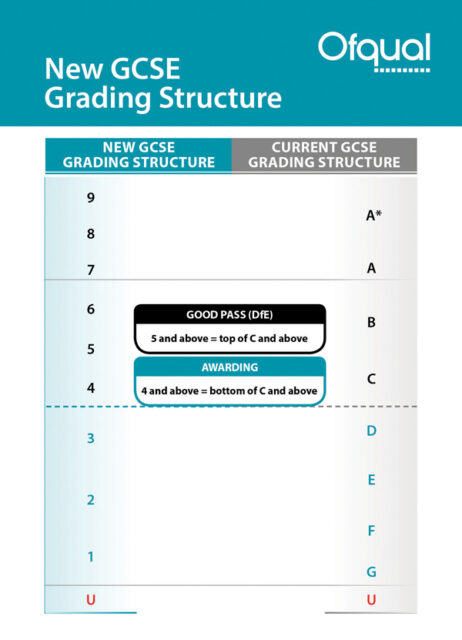The government has abandoned its plan to make a grade 5 the new ‘good’ GCSE pass grade which was aimed at bringing England into line with global competitors.
In 2015, the government announced the new grade 5 – due to be awarded for the first time this summer – would be the new “good pass” level. It said the grade would be set at a standard comparable to that “aimed for by pupils in top-performing countries such as Finland, Canada, the Netherlands and Switzerland”.
A standard pass is a credible achievement and one that should be valued as a passport to future study and employment
However, the education secretary Justine Greening announced today that a grade 4 will now be considered “a standard pass”, while grade 5 will be called a “strong pass”.
The proportion of pupils passing at both grades or above will be reported in school performance tables. The grade 5 “strong pass” will be the benchmark in the goverment’s new EBacc accountability measure.
In a letter to education committee chair Neil Carmichael, Greening said she was “determined to continue to raise standards” and would include the new “strong pass” as an accountability measure for schools.
However, Greening also said she wanted to reassure schools that a grade 4 was a “credible achievement” and one that “should be valued as a passport to future study and employment”.
The education secretary said the change had resulted from a desire to provide “certainty about how this new grading will work”.

“Rather than reporting on the good pass, we will instead distinguish between a grade 4 as a standard pass and a grade 5 as a strong pass and report on both,” she said.
Greening has also announced that grade 4 will continue to be the level pupils must achieve in English and maths to avoid compulsory post-16 re-takes, adding that a grade 4 will “continue to have real currency for individual pupils”.
The change comes almost two years after Schools Week exclusively revealed the designation of a grade 5 as a “good pass” would mean that around one in five pupils who previously passed their GCSEs would no longer do so.
Under the new announcement, those pupils will now receive a “standard pass”.
Greening said she expected that where colleges and employers currently ask for a C grade or above, they will now ask for a grade 4 – that is, the “standard pass”.
Grade 5 will only be awarded to the top third of pupils achieving the current C grade. Pupils who achieve a middle or low C will receive a grade 4.








What about Grades 1, 2 and 3? Will they be substandard passes? Greening’s attempt to clarify the new grading system has only muddied things further.
U = Ungraded, Grade 1 = F, Grade 2 – E, Grade 3 = D, Grade 4 = Standard Pass, 5 = Strong Pass, Grades 6,7,8 allow students to progress to A Level in that subject, Grade 9 – A** (very unlikely to achieve as only awarded to tiny top percentage of candidates). The new GCSEs are designed to be more challenging and this system is designed to align with other countries and stretch out the grades so pupils can realise what they are good at rather that getting 6 A*s. It is a better system and schools should embrace it, even if some grades are lower on merit.
If Grade 3 = D, then Grade 4 = C and Grade 5 = C+. Grade C used to be the minimum requirement to progress to A level. But according to your reasoning above only those gaining 6 and above will go on to A level. Surely this would prevent pupils who would previously have gone on to academic sixth form from doing so.
Re aligning England with other countries: few other countries have such high stakes exams at 16. Where they exist, they are fewer in number and are used to decide post-16 progression and not to judge schools.
No, students will needs to get standard pass Grade 4 in English and Mathematics to progress to A Level choices but will need at least a Grade B (in 2017, last year for letter Grades) or Grade 6 (from 2018 onwards when subjects are graded 1-9) in their A level subject choices, e.g., Biology Grade 6, History Grade 7, Psycology Grade 8. Our sixth form college is accepting Grade 4 English and Maths as passes to progress to A level with a B or higher in 3 subject choices.
What utter nonsense. If the GCSE is to be a valid test of knowledge and understanding then the mark pattern will follow the ‘bell curve’ normal distribution. This will be the case whatever labels are attached to the grades.
Absolutely right. This is so obvious as to make anything else the government does to tinker with the system utterly irrelevant and just annoying noise with stupid real world emotional and administrative consequences
This is very good because I am dumb and I need this people!
Good Luck with your exams – you’re not dumb – believe in yourself – these exams are very hard. X
This is a U-turn. Gove’s attempt to ‘raise standards’ by tinkering with grade labels and mark cut-offs now abandoned.
F = Proper Fail
1 = Not really a pass
2 = Not really a pass
3 = Not really a pass
4 = Standard pass
5 = Strong pass (previously a Good pass)
6 = Amazing pass
7 = Spectacular pass
8 = Brilliant pass
9 = Bloody miracle pass
Nicely put!
Making it up as we go along. Great way to run an education system and to plan for the future of our children
I think we need to give Justine Greening some credit for her interventions. She knows damn well that it is an almighty mess up. She has INHERITED this SHAMBLES from Gove, which two of my children are unfortunately caught up in with 2016 SATS and 2017 new GCSEs. It will very difficult for even bright children to get the Grade 5 due to the enormous quantity of material studied in great depth; I studied O Level including Shakespeare, T Hardy and G Eliot and I am confident that this is more akin to facing A Level standard at 16). Well done to those children who DO achieve a “Strong Pass”. It will cost too much in time and resources for resits for those achieving 4 “Standard Pass”. FE will accept 4 and rightly so.
But what happens to those thousands of pupils who gain grades 1, 2 and 3? When GCSEs were introduced, it was made clear that ALL grades were passes. The achievement of each student would be made clear by the grade. Grade G was the most basic. Grade C was supposed to be a sign of above-average achievement but over the years it was debased to ‘average’ then ‘basic’.
Re O level. O level English had no literature content. It comprised a one-and-half-hour paper (one essay, one comprehension and one precis). O level Literature required study of only three texts. One of the most popular novels was ‘My Family and Other Animals’ by Gerald Durrell. An entertaining read, but hardly great literature. My O level Lit course didn’t even contain a novel. I did two plays (Shakespeare and Shaw) and poems by Tennyson.
Exactly, I agree Janet, that the old O Levels were much easier in their content than the new GCSEs: English Language was a short reading comprehension on unseen material and a choice from 8 essay story titles and a formal letter/English Literature was pre-studied but no books in the exam 1 Shakespeare, 1 George Elliot 1 set of Hardy poems. Now students have to cope with unseen text extracts from 20/21 Century and annotating unseen pooems using literary techniques – very difficult. Incidently, Gerald Durrell can now be found on KS2 SATS 10/11 year old papers! Hard for 10 year olds in a test. And all thanks to Gove.
I think it’s fantastic that the new grading is coming into force …Now at least pupils know they have got a far better chance in getting a pass in English and maths …Good need all around ……..
Thanks Suzanne – I agree. And goodluck to all the students X
*Unprintable*
As an FE teacher of maths, what still surprises me is the low levels that are coming out of schools but have achieved a grade D. A lot of these learners are missing the basic understanding of number and it’s workings such as multiplication and subtraction. Surely this is where we need to be focusing to improve standards!
My daughter achieved a grade 4 in Maths this year in the new 9-1 grading system. She is now been told by her school that they strongly recommend that she re-sit her Maths GCSE again in Nov 2017 to aim for a grade 5, because some Universities are not accepting grade 4. She feels totally let down and feels that the goal posts have now been moved after being advised since March 2017 that a grade 4 was a pass.